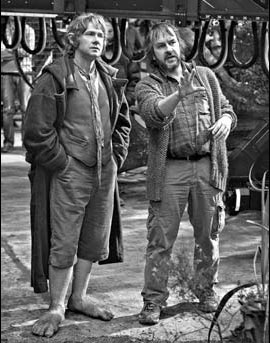With 'Hobbit,' New Zealand fuses film and tourism
Mr. Key has been sharply criticized for cozying up to Mr. Jackson, a fellow New Zealander. Phil Darkins, a vice president of Actors Equity in New Zealand, calls his country the "only Western democracy on the planet where professional performers have virtually no rights."
Mr. Darkins also objected to immigration law changes that allow foreign film workers into the country for brief periods without review by local worker groups.
The opposition Labour Party, while backing the government's support for the film industry, has chafed at what it views as the "Warner Brothers-specific" concessions made by Mr. Key.
The making of feature films and TV shows generated only about $1.1 billion in revenue for New Zealand last year, well under 1 percent of a gross domestic product of roughly $160 billion. About 17 percent of movie and TV revenue is directly subsidized by the national government, which spent nearly $200 million to support movies last year.
But the tourism industry is 20 times the size of the country's movie and television production business. And as other countries, notably China, have moved into some of New Zealand's core dairy industry, the Kiwis have focused more on the vacation market.
The thinking: Movies may draw visitors who are not up to the rigors of bungee-jumping, zorbing (rolling downhill inside a plastic ball) or other outdoor sports that are tourism mainstays.
Scratching for solutions to the 2010 crisis with unions over "The Hobbit," Mr. Key, who is also the tourism minister, settled on using much of the tourism budget to re-brand the country as Middle-earth, hoping to lure visitors to Mr. Jackson's film locations.
But there is no guarantee moviegoers will embrace the "Hobbit" films with the same fervor as the "Rings" trilogy, with combined global ticket sales of $3 billion.
Other big questions remain, including the capricious nature of the filmmaking business, which will quickly flee to the government offering the best incentives.
Exchange rates play a sizable part in the bidding process. Favorable rates were one reason Mr. Jackson and his partners were able to build New Zealand into a crossroads for special effects and postproduction work. "Avatar," "Marvel's The Avengers," "The Adventures of Tintin" and "Prometheus" are among the many films that have crossed through Mr. Jackson's Wellington-based effects shop, Weta Digital, on their way to theaters.
But recently a stronger New Zealand dollar has eroded its cost advantage for North American companies. Northern Ireland now claims to be the "new New Zealand," while Serbia says it is "New Zealand, but cheaper," notes Gisella Carr, chief executive of Film New Zealand, which scours the globe for film work.















